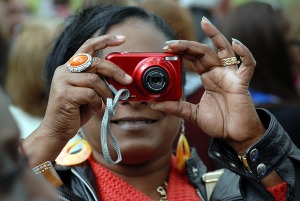Imagine you’ve invested your time and money into building your own house. Pleased with your efforts, you take a photo and share it publicly with friends and family. It’s natural to assume that since you paid for the building, you own the design.
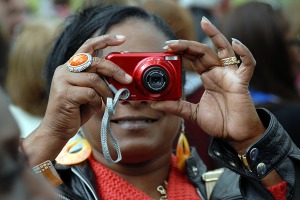
But unless you asked the architect to release ownership of the building design to you, you would be infringing on copyright law and could be sued by the architect.
In Ghana, and many other parts of the world, copyright exists as soon as something that has original creative input added to it is made.
This prohibits anyone from copying, editing, republishing or sharing the image without the creator’s permission. That is why, in 2017, a Canadian couple in Toronto was able to sue their neighbour for copying the design of their house. Read the story here.
While copyright laws in Ghana and various parts of the world, provide absolute protection to the creator’s work, they also throw up limitations. In most countries, copyright lasts for 70 years after the creator’s death which means at least a generation would have to pass before the public could freely access the information. Click Ghana Copyright Act for more on the country’s rules on copyright.

Ghana’s architecture
One visible example in Ghana is in the country’s collection of slave castles. Copyright has long since expired, giving the public access to photograph, reproduce and share these images without permission. This is known as Freedom of Panorama (FoP).
More contemporary images of Ghana’s architecture, such as the National Theatre or the Presidential Palace, cannot be shared legally in the same way. I say legally because if you surf the net, you’ll find the images there but if you are operating within the law, there is a legal risk to you republishing them.
Ghana’s image
This legal restriction has repercussions for Ghana and how it is viewed by the outside world. Already, a simple Google search using the words ‘Africa’ or ‘Africans’ highlights just how many poverty porn images and nature scenes continue to dominate the web. These images serve to reinforce skewed and often negative views about Africa and Africans to those that have never set foot on the continent.
In the case of Ghana, if the only architectural images that can be legally photographed, shared and reproduced are those reflecting our colonial past when the country’s architectural scene has moved on massively to encompass works by Ghanaians, aren’t these copyright laws perpetuating this imperialist stereotype? And isn’t it incumbent on the government to project a more balanced view of the country that allows contemporary architecture to be freely shared without fear of litigation?
Creative Commons Ghana
These questions and more were explored at a copyright workshop organised by Creative Commons (CC) Ghana – a chapter or branch of the umbrella organisation Creative Commons based in the US. CC Ghana works to encourage the use of free, easy-to-use licenses that give the public the permission to share creative work under certain conditions.
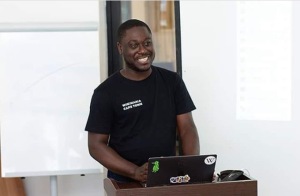
Felix Nartey, who is the chapter lead for CC Ghana, outlined the benefits of free licences at a recent copyright workshop. These licences can be added to copyright material to give varying levels of acknowledgement to the creator, and degrees of republishing, editing and sharing rights to the user.
[Click to find more licences here].
In doing so, there is greater opportunity for creatives in Ghana to have their name and work shared globally while still retaining a degree of control over how their content is distributed.
Nartey, who is the co-founder of Open Foundation of West Africa (OFWA), which started CC Ghana, used the example of a blogger from Germany who had wanted to interview him and use Ghanaian music as the background in the interview. Unfortunately, the blogger was not able to legally access a great deal and had no option but to use a brief sound on drumming that he found on open licence, Nartey said.
Promoting stereotypes
So is Ghana’s copyright law promoting a stereotypical, racist image of the country, I asked Nartey. He believes so.
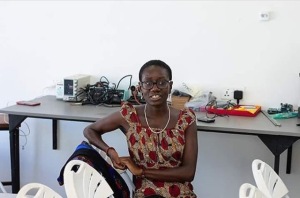
“I totally think that our laws unintentionally promote a racist/colonialist image of our country,” he said. “At the moment, the copyright law allow us to only publish art and structures (buildings) of slave trade since none of the new developments meet the time stipulations of our regulation. And most people take pictures and publish them without knowing this law. Ignorance of the law does not protect you as you can legally be taken on.”
With Ghana’s wealth of musical genres, talented up and coming artists, designers and other creatives, there is scope for their works to reach a wider audience through open licences that will help them gain greater exposure but still allow them to retain recognition of their work and the future potential to benefit financially from it. According to Nartey this is one way that Ghana/Ghanaians can help to project a more balanced image of the country and its people to the outside world.
Lobbying government
For now, it seems the most pressing challenge is in getting the public to understand this potential and push government to revisit how copyright law is implemented. The latter is all the more critical when you know that the Ghanaian Government committed to the Open Government Partnership in 2011, which seeks to promote transparency, enhance citizen’s participation, promote accountability and adopt new technologies to enhance good governance.
Under this agreement, the country is required to put most of the information of public interest under open licences [such as state of the nation addresses, government budget accounts and government procurement plans]. And, according to a source close to the issue, this requirement also includes FoP because it is something that projects the image, the good name of the country and promotes transparency.
Over to you
“Restrictions such as these affect our image globally as media like Wikipedia cannot cover anything but colonial information from this country and this affects all of us,” said Nartey. “In order for all of us to gain, the Creative Commons Chapter in Ghana wants to conscientise as many people as possible of the problem, and how it affects each one of us. We will provide training and possibly advocate that the government reviews our copyright law to be abreast with the digital age, and to provide a reasonable sense of protection for creators.”
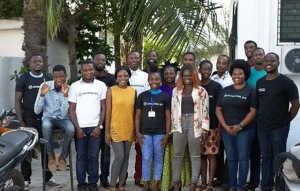
Get involved
CC Ghana is part of the umbrella organisation Creative Commons – an American non-profit organisation devoted to expanding the range of creative works available for others to build upon legally and to share. These licenses allow creators to communicate which rights they reserve, and which rights they waive for the benefit of recipients or other creators.
The CC Ghana branch was created by OFWA to extend access of creative works under free licence in Ghana. OFWA is a non-profit organisation that seeks to extend the activities and reach of the open movement in the West African sub-region, through open education and education programmes, digitising open resources, preserving cultural and heritage items for educational purposes.
Find out more about the organisations here:
OFWA,


